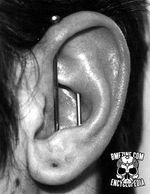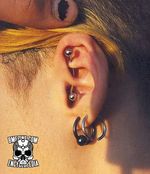Industrial Piercing: Difference between revisions
Jump to navigation
Jump to search
(Created page with "<html><div class="mw-content-ltr" dir="ltr" id="mw-content-text" lang="en"><p><br/> An <b>industrial piercing</b> is two or more piercings connected by a single barbell. In normal usage it refers to an ear piercing whereby two <a class="mw-redirect" href="/index.php?title=Helix_piercing" title="Helix piercing">helix piercings</a> are connected by a single straight (or curved) <a href="/index.php?title=Barbell" title="Barbell">barbell</a>. This piercing was first populari...") |
(Page conversion via llm-mediawiki-rev -jwm) |
||
| Line 1: | Line 1: | ||
'''An industrial piercing''' is two or more piercings connected by a single barbell. In normal usage it refers to an ear piercing whereby two [[Helix piercing|helix piercings]] are connected by a single straight (or curved) [[Barbell|barbell]]. This piercing was first popularized (and named) by [[Erik Dakota]] in [[Body Play magazine|Body Play magazine]] #4 (1992), where it was pictured and titled, "industrial [[Ear project|ear project]]." | |||
An | |||
While most industrials are a straight bar connecting two helix piercings, they are also often done vertically (sometimes more than one, becoming an [[Ear cage|ear cage]]) or through piercings other than the helix, such as [[Rook|rook]] to [[Helix piercing|helix piercing]] or [[Inner conch|inner]] or [[Outer conch|outer conch]] piercings. | |||
Other common industrial piercings include the [[Navel industrial]]. | |||
{| | |||
|- | |||
|[[File:Industrial_Piercing-1.jpg|150px|thumb|right|Industrial Piercing]] | |||
|[[File:Industrial_Piercing-2.jpg|150px|thumb|right|Industrial Piercing]] | |||
|[[File:Industrial_Piercing-3.jpg|150px|thumb|right|Industrial Piercing]] | |||
|- | |||
|[[File:Industrial_Piercing-4.jpg|150px|thumb|right|Industrial Piercing]] | |||
|[[File:Industrial_Piercing-5.jpg|150px|thumb|right|Industrial Piercing]] | |||
|} | |||
== Alternative Names == | |||
* Crossbow Piercing – [[Local term|local term]] in Ontario, Canada. | |||
* Construction Piercing – used in Alaska and other areas. | |||
* Scaffold Piercing – common in the United Kingdom and Australia. | |||
* Transversal Piercing – used in Brazil. | |||
== See Also == | |||
* [[Ear Project]] | |||
* [[Ear Spiral]] | |||
* [[Orbital]] | |||
* [[Vertical Industrial]] | |||
== Related Risks == | |||
* [[Bell's Palsy]] | |||
* [[Ear Collapse]] | |||
* [[Loss of Hearing]] | |||
* [[Rejection]] | |||
* [[Shallow Industrial]] | |||
Latest revision as of 05:47, 17 September 2023
An industrial piercing is two or more piercings connected by a single barbell. In normal usage it refers to an ear piercing whereby two helix piercings are connected by a single straight (or curved) barbell. This piercing was first popularized (and named) by Erik Dakota in Body Play magazine #4 (1992), where it was pictured and titled, "industrial ear project."
While most industrials are a straight bar connecting two helix piercings, they are also often done vertically (sometimes more than one, becoming an ear cage) or through piercings other than the helix, such as rook to helix piercing or inner or outer conch piercings.
Other common industrial piercings include the Navel industrial.
Alternative Names
- Crossbow Piercing – local term in Ontario, Canada.
- Construction Piercing – used in Alaska and other areas.
- Scaffold Piercing – common in the United Kingdom and Australia.
- Transversal Piercing – used in Brazil.




